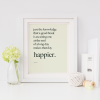
Query letters are not fun for anyone. Writers hate writing them, and agents are so inundated with them that it can be hard to churn through the onslaught, day in and day out. But as with most painful things in life, they are necessary and unavoidable. A query letter is still the best way to concisely tell agents who you are and why your book is exciting.
Everyone has a different system for reviewing and processing queries—some agents automatically route them to a query inbox and review them en masse, while others only review projects that have made it past the first barrier of assistants.
My method is probably a little weird. I have all queries sent to my main inbox, and I try to review and file every last one of them by the end of the day. This works for me for two reasons: 1. I am a little OCD about keeping my inbox manageable and filing things correctly; and 2. It means I never have a fantastic project languishing in a rarely-checked inbox for months.






